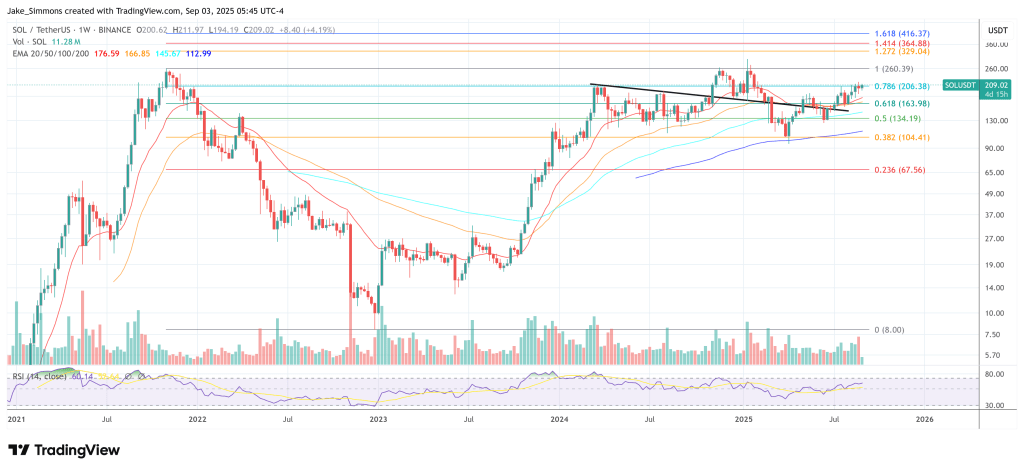Solana validators have overwhelmingly approved SIMD-0326 “Alpenglow,” a sweeping consensus rewrite that aims to cut transaction finality from roughly 12.8 seconds to about 150 milliseconds-a 100x reduction that developers and observers are already calling the most consequential upgrade in the network’s history. 🚀 According to the official tally shared via Solana Status, 98.27% of stake voted Yes, 1.05% voted No, and 0.69% abstained, with 52% of total stake participating. 😱
Solana Slashes Finality By 100x
“The community governance process for SIMD-0326: Alpenglow is complete. The proposal has passed: 98.27% Yes, 1.05% No, 0.69% Abstain; 52% of the Stake cast a vote,” Solana Status posted on X on September 2. Anza, the Solana R&D firm that authored the proposal, added context for operators: “Mainnet-beta is in epoch 843 which concludes the voting process for SIMD-0326: Alpenglow. The proposal has passed with 98% of stake voting Yes.” 🤯
JUST IN: Alpenglow, the most significant consensus upgrade proposal in @Solana’s history, aiming for 150ms block finality, has passed governance. 98.27% voted ‘Yes’, 1.05% voted ‘No’, with 52% of the Network stake participating.
– SolanaFloor (@SolanaFloor) September 2, 2025
Alpenglow replaces core elements of the existing consensus-Proof-of-History (PoH) and TowerBFT-with two new components designed for real-time performance: Votor, a direct-vote finality engine that achieves sub-second confirmations via single-round finalization in the “fast path” (when ~80% of stake is responsive) or two rounds in a 60% fallback; and Rotor, a streamlined block propagation layer intended to supplant Turbine and cut network overhead. ⚙️
In practice, that architecture is what underpins the ~150-200 ms confirmation targets. Beyond raw speed, Alpenglow touches validator economics and fault tolerance. With vote transactions moving off-chain, Solana will eliminate per-slot vote fees and introduce a fixed Validator Admission Ticket (VAT)-initially 1.6 SOL per epoch-that is burned. 💸
The model aims to preserve economic friction against spam even as vote traffic leaves the ledger, while simplifying load on the network. Separately, the design targets a “20+20” resilience envelope: safety if up to 20% of stake is adversarial and liveness if an additional, disjoint 20% is offline. These mechanics were debated in the forum during the governance window and were reiterated in technical explainers ahead of the vote. 🤷♀️
Governance mechanics and timeline. The governance process followed the steps laid out on the Solana forum: discussion in epochs 833-838, stake weights captured in epoch 839, and voting in epochs 840-842, with passage defined as Yes ≥ two-thirds of (Yes + No) and a 33% quorum in which abstentions count toward quorum. Anza’s epoch-843 note simply marks the moment the chain passed the voting boundary on mainnet-beta. 🎉
With the validator signal secured, Alpenglow now moves from governance to engineering reality. Whether it ultimately delivers stable ~150 ms finality at scale is a question only testnet and mainnet can answer-but the 98% approval makes clear the Solana ecosystem’s directional bet: real-time blockchain. An official implementation schedule remains forthcoming. 💻🔥
At press time, SOL traded at $209. 💸

Read More
- Best Controller Settings for ARC Raiders
- Gold Rate Forecast
- Survivor’s Colby Donaldson Admits He Almost Backed Out of Season 50
- How to Build a Waterfall in Enshrouded
- How to Get the Bloodfeather Set in Enshrouded
- Meet the cast of Mighty Nein: Every Critical Role character explained
- Where Winds Meet: How To Defeat Shadow Puppeteer (Boss Guide)
- Everything Coming to Netflix This Week (October 20th)
- Why XRP Still Stuck, Despite Ripple’s Mega Moves: The Saga of a Digital Underachiever
- Black Mirror’s Charlie Brooker reveals “horrible” moments he cut from Common People
2025-09-03 14:00